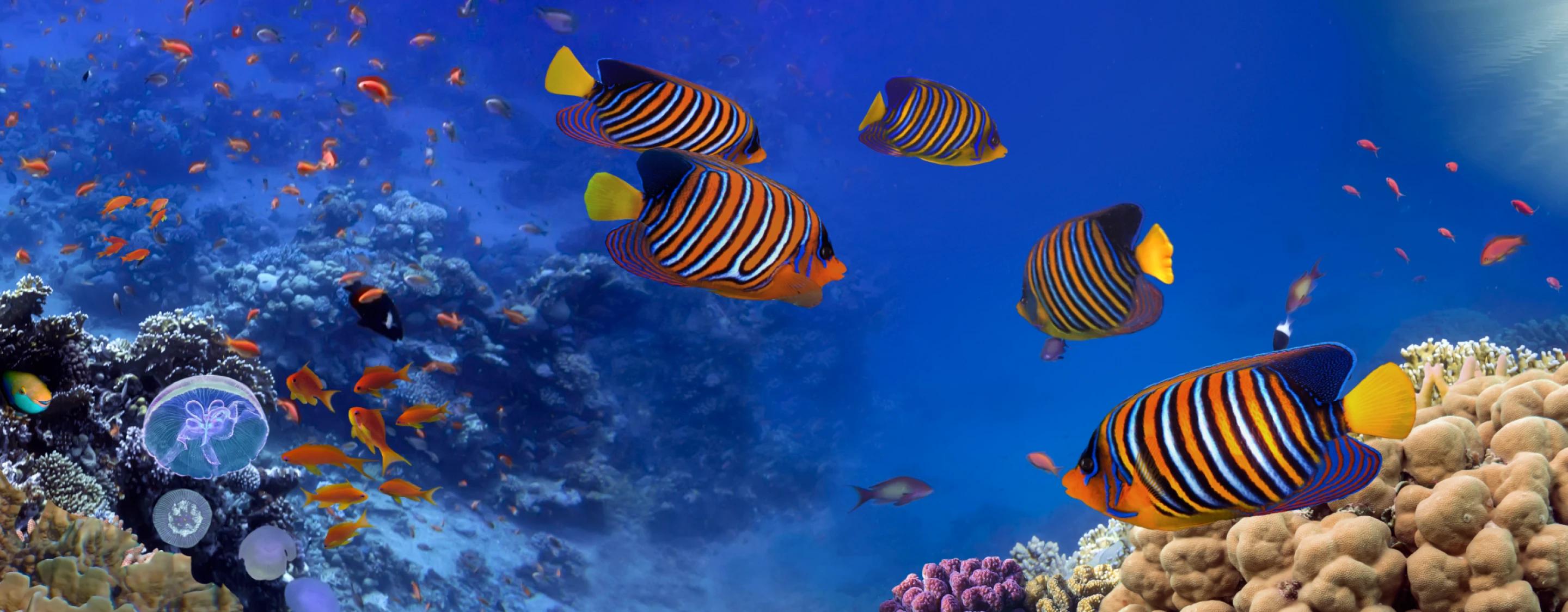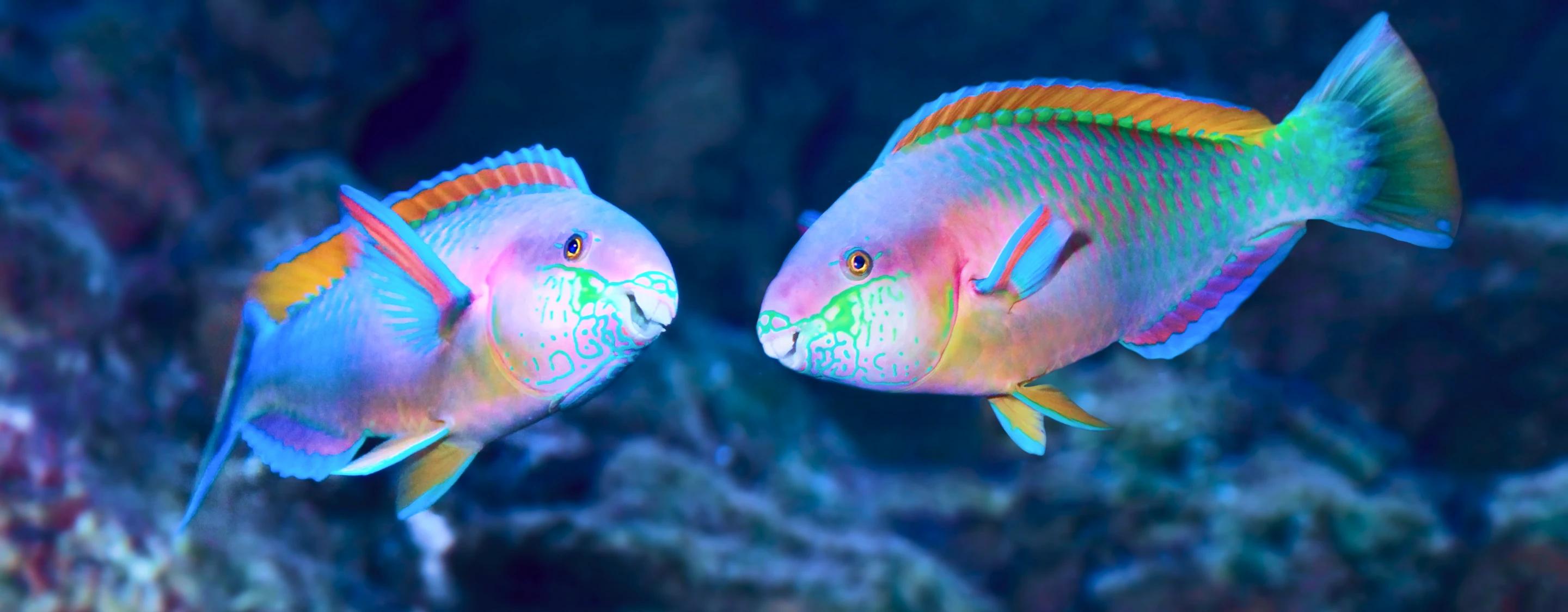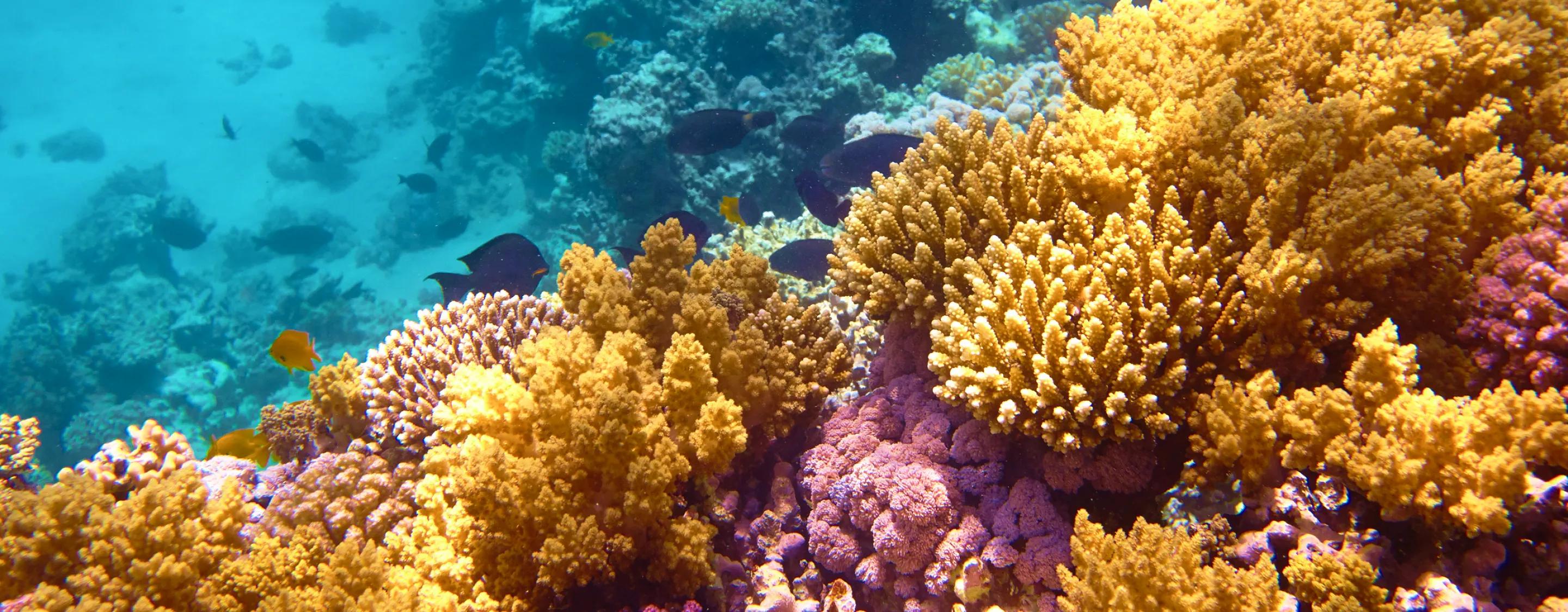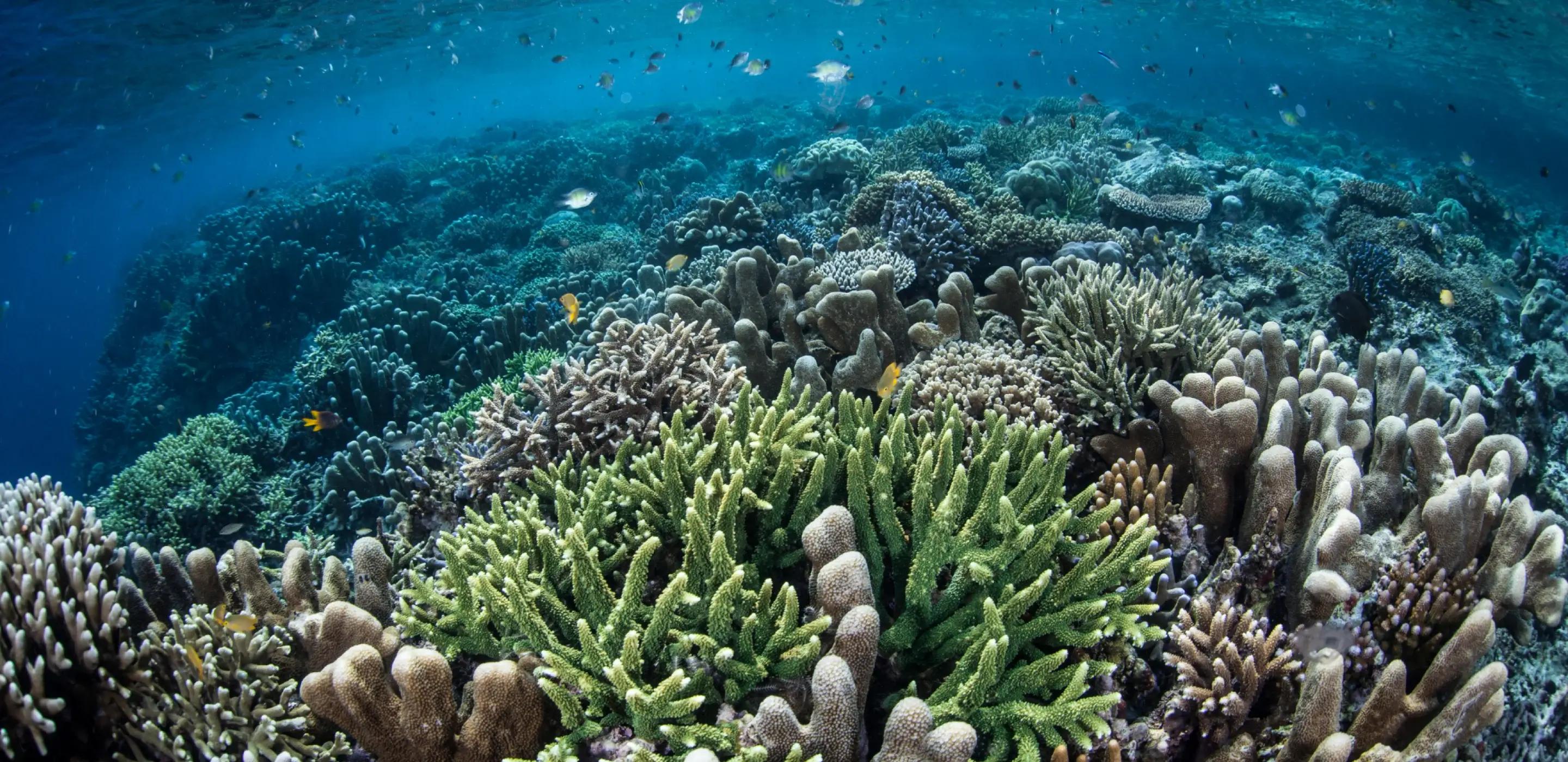
Key GFCR Announcements at COP28
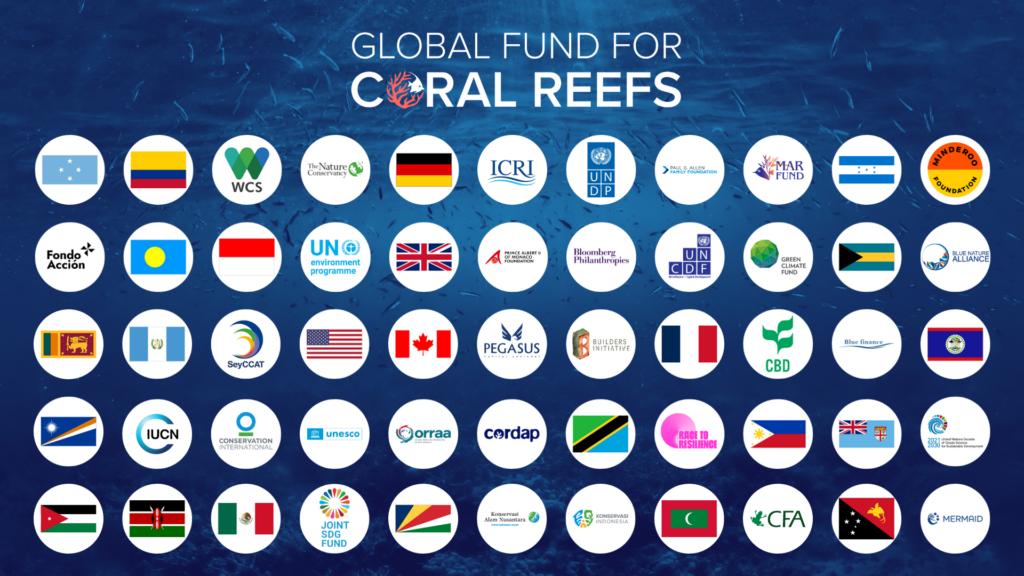
Launching funding commitments from donors and investors, as well as new transformative investments for coral nations, the Global Fund for Coral Reefs Coalition announces acceleration of ocean resilience action at the 2023 UN Climate Conference.
Dubai, 2 December 2023 – Day three of 28th Conference of the Parties to the UN Framework Convention on Climate Change (COP28) witnessed state representatives, philanthropies, UN Agencies, and impact investors convene to launch resilience-focused actions in line with the newly established targets of the 2030 Coral Reef Breakthrough. Announcements included pledges toward the Breakthrough targets, new private investments, and the launch of new transformative blended finance programmes for five coral reef nations.
Launched by the High-Level Climate Champions, the International Coral Reef Initiative (ICRI), and the GFCR, and supported by the United Nations, the Coral Reef Breakthrough aims to secure the future of at least 125,000km2 of coral reefs – an estimated 50% of remaining coral reefs globally – by 2030 through investments of at least $12 billion USD. The GFCR will support the achievement of the Coral Reef Breakthrough by catalysing public and private financial flows to impactful investments that benefit the resilience of coral reef ecosystems and coastal communities. By working to achieve the targets of the Coral Reef Breakthrough, the GFCR Coalition aims to help prevent the first functional extinction of an entire ecosystem in our lifetime.
At COP28, representatives of the GFCR Coalition announced the mobilisation of more than $200 million USD as an initial direct investment toward the newly established Coral Reef Breakthrough targets to scale conservation solutions. This GFCR funding represents recent and new commitments from donors and private investors, including Bloomberg Philanthropies, Builders Vision, Minderoo Foundation, the Green Climate Fund, as well as the Governments of France, the United Kingdom, Canada, and the United States of America.
The Honourable Steven Guilbeault, Minister of Environment and Climate Change, Canada, stated: “I am pleased to announce Canada’s commitment to join the Coral Reef Breakthrough. Coral reefs play a critical role in enabling resilience and adaptation to climate change, as well as maintaining marine biodiversity and ecosystem health. This initiative not only underscores our dedication to environmental stewardship but also emphasizes our commitment to the well-being of the communities that rely on coral reefs for their safety and livelihoods.”
In addition to mobilising greater co-financing from global actors, the GFCR Coalition announced an ambition to directly raise and invest an additional $500 million USD towards Coral Reef Breakthrough actions by 2030, leveraging public and private investments with the potential to amplify conservation returns up to $2.5 billion USD.
Leticia Carvalho, GFCR Executive Board Co-Chair & Head of Marine and Freshwater Branch, United Nations Environment Programme, stated: “The Global Fund for Coral Reefs (GFCR) Coalition is committed to helping deliver on the Coral Reef Breakthrough targets, to support successful implementation of the Global Biodiversity Framework, to preserve coral reefs, for ours, and future generations. We know that good intentions are only as good as the financial force behind them. Today’s announcements reflect the solid strategy and partnerships in place to get us there. At this pivotal moment for our blue planet, the GFCR invites countries, private investors, financial institutions, and philanthropies to join our Coalition working to scale ‘reef-positive investment’ towards achievement of the Coral Reef Breakthrough.”
“Forty percent of the global population lives along coastlines and are directly impacted by climate change’s damage to our oceans, yet initiatives to help the coral reefs and these communities are drastically underfunded,” said Craig Cogut, founder, chairman, and CEO at Pegasus Capital Advisors. “As one of the only funds dedicated to scaling financial solutions for coral reefs and their connected communities, this initiative not only protects crucial ecosystems but establishes a precedent for responsible investment, fostering positive change for the planet and for people.”
Additionally, during the COP28 Coral Reef Breakthrough launch event, GFCR representatives also announced the launch of three new programmes to support five coral nations; the Democratic Socialist Republic of Sri Lanka, the Hashemite Kingdom of Jordan, the Federated States of Micronesia, the Republic of the Marshall Islands, and the Republic of Palau.
For Sri Lanka, the new programme led by the International Union for Conservation of Nature (IUCN) will focus on protection of climate ‘refugia’ coral reefs that have the potential to withstand climate impacts through the scaling of 12 sustainable reef-positive enterprises. The Sri Lanka programme is expected to increase the resilience of 150,000 coastal community members and nearly 250,000 hectares of marine area, including more than 30,000 hectares of biodiversity-rich coral reefs. Led by the United Nations Development Programme (UNDP) Jordan Country Office, the newly launched Gulf of Aqaba Resilient Reefs Programme will employ a blended finance approach to catalyse greater private investment into reef-positive sectors, including wastewater treatment, ecotourism, and sustainable fisheries. The programme is part of a wider UNDP regional approach expected to unlock up to an additional US$ 30 million in private investment to support coral reef conservation in the Gulf of Aqaba and Northern Red Sea. Finally, building off the strong foundation established by the Micronesia Challenge over the past two decades, the new GFCR Micronesia regional programme led by The Nature Conservancy aims to effectively support the management of 50% of the region’s marine resources through sustainable blue economic investments.
Dr. Anil Jasinghe, Secretary of Environment, Ministry of Environment Sri Lanka, stated, “The Ministry is glad to see the development of Sri Lanka Coral Reef Initiative proposal with multi-stakeholder collaboration and look forward to seeing the successful co-management mechanisms on ground with much optimism, as they have clearly recognized the siloed management of different sectors is not going to provide intended benefits of environmental management. Furthermore, the plan to sustain co-management of selected seascapes beyond the programme period through blended financing seems to be a lucrative approach, while the ministry believes in the capacity of IUCN Sri Lanka to achieve these milestones of better managed seascapes and coral-positive businesses, uplifting coral-dependent communities and coral related economic sectors ensuring the resilience of both coral reefs and communities.”
Randa Aboul-Hosn, the Resident Representative of UNDP Jordan, stated, “We are delighted at the launch of the Gulf of Aqaba Resilient Reefs Programme. This transformative initiative will attract private investment into reef-positive enterprises, benefiting Aqaba’s marine life and communities. Through blended finance, we will protect Aqaba’s coral reef refugia, advance science on reef resilience, establish sustainable finance mechanisms, and empower local communities. With over 260 hectares of reef revitalization, a 700-hectare fishing area restoration, and investment in reef-friendly businesses, we are driving positive change. UNDP is committed to climate action and integrated development solutions. We invite all stakeholders to join us in preserving the Gulf of Aqaba’s coral reefs and securing a sustainable future.”
To underscore the impact of GFCR’s work on incredibly biodiverse and heritage-rich reefs, Dr. Fanny Douvere, Head of Marine Programme at the United Nations Educational, Scientific and Cultural Organization (UNESCO) World Heritage Centre stated, “The Rock Islands Southern Lagoon in Palau is the second World Heritage site to benefit from the Global Fund for Coral Reefs’ regional programme funding and financial mechanisms since UNESCO signed the partnership with the Fund.” Dr. Douvere further added, “The financial support will complement the work of the Resilient Reefs Initiative and focus on further reducing local drivers of degradation, strengthening the sustainable management of the World Heritage area, and supporting local communities.”
About the Global Fund for Coral Reefs
The Global Fund for Coral Reefs (GFCR) is a unique blended finance vehicle dedicated to coral reefs globally. Hosting both a Grant Fund and an Investment Fund, the GFCR is designed to scale financial solutions and blue economic transition that bolsters the resilience of coral reefs and the communities that depend on them. In more than 20 coral nations, GFCR focuses on incubating and scaling financial interventions and enterprises that address local drivers of coral reef degradation, unlock conservation funding flows, and increase communities’ adaptive capacities. Supported solutions include waste treatment and recycling facilities, coral reef insurance, sustainable aquaculture and agriculture, ecotourism enterprises, blue carbon credits, and sustainably financed Marine Protected Areas (MPAs).
The GFCR Coalition is a public-private partnership driven by Member States, UN Agencies, financial institutions, philanthropies, impact investors and organisations. The GFCR Coalition includes more than 20 coral nations, the Paul G. Allen Family Foundation; Prince Albert II Monaco Foundation; Minderoo Foundation; the Governments of Germany, France, Canada, the United States and the United Kingdom; the Green Climate Fund; Pegasus Capital Advisors; Builders Vision; Bloomberg Philanthropies; the International Coral Reef Initiative (ICRI), the United Nations Development Programme (UNDP); United Nations Capital Development Fund (UNCDF); the United Nations Environment Programme (UNEP); the International Union for Conservation of Nature (IUCN); the Ocean Risk and Resilience Action Alliance (ORRAA) and the Coral Research & Development Accelerator Platform (CORDAP).
Dive deeper at www.GlobalFundCoralReefs.org and join our coral reef action communities on Instagram, Twitter, LinkedIn and YouTube.
For media enquiries, please contact Nicole Trudeau, Strategic Engagement & Partnership Specialist, UNCDF, at nicole.trudeau@uncdf.org and Kristine Bunda, GFCR Communications Support, UNCDF, at kristine.melvie.bunda@uncdf.org.
